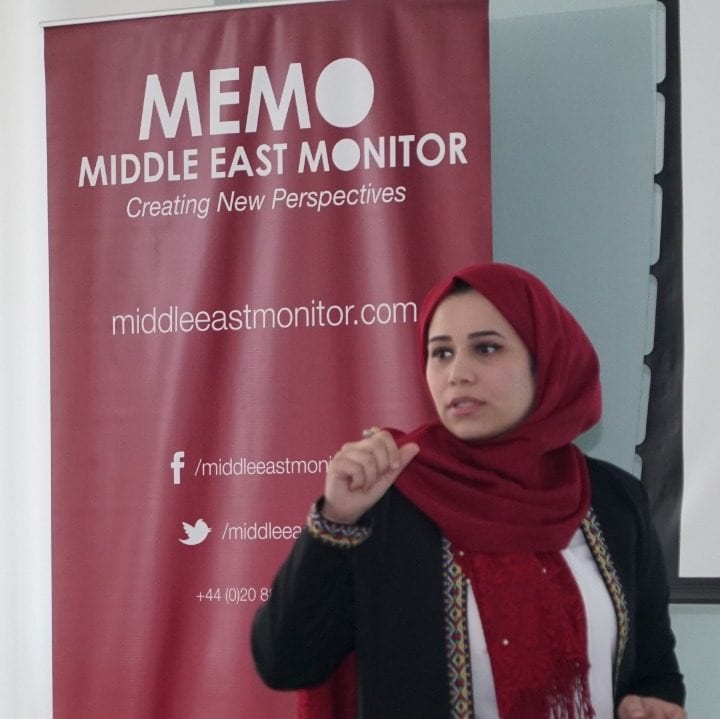Many of us have never heard about the martyrs of Al-Buraq Revolution except through the popular song “Min Sijjin Akka” (“From Akka Prison”), which mentions Fouad Hijazi, Atta Al-Zeer, and Mohammed Khalil Jamjoum. The lyrics of this song have become part of Palestinian heritage and are sung at national events, weddings, and cultural celebrations. Whether protesting against oppression, criticising the occupation government, or resisting the occupation, music has unique potential for the Palestinian struggle.
I caught up with popular singer and music teacher Aya Halaf to ask her about this phenomenon. ” To me,” she explained, “art and singing is a way that I can express the reality of how I live and how my people live their daily lives.”
We spoke just after the Israeli occupation forces had stopped her from singing traditional songs in the Old City of Jerusalem because she didn’t have a permit to do so. Halaf and some fellow musicians had planned to do a pop-up show in the Old City. “We started singing while the Israeli police were watching us. They stopped us, asked what we were singing, and said that it is not allowed without a permit from the municipality,” she told me. “It was a spontaneous decision to share some songs with the people. We chose the Old City because it is being deliberately emptied of such activities, so we wanted to sing with the people a little bit.”
Aya Halaf was born in Jatt village in the northern West Bank. She both sings and teaches about Palestinian musical heritage. She graduated in oriental music from the Music Academy at the Hebrew University of Jerusalem. Throughout her time at university, she worked as a music teacher for the children of Jerusalem and many towns across the Palestinian territories.
She is particularly interested in Palestinian oral history and documents authentic folklore gleaned from elderly Palestinian women. “I use a method called ‘from mouth to ear’. I listen directly to the women singing at weddings and other occasions; I memorise what they sing, and then I write it down.” Halaf finds that this is a great way to preserve Palestinian heritage and pass it down through the generations to save it from oblivion.
The singer is just one of the Palestinian artists who have grown up under the domination of the Israeli occupation. According to Halaf, music lends itself to being created in the midst of chaos and suffering. “This is a fact. Your grievances and rejoicing can all turn into anger, so then you simply sing.”
She told me about teaching music at a primary school in Shuafat Refugee Camp on the outskirts of Jerusalem where she and the children could hear shooting outside the school. “That was the daily routine for the children. They heard music at school and bullets at the door. Despite this, the children often chose to continue singing. I learned from them how to create music despite the suffering.”
![Aya Halaf surrounded by children [Aya Halaf]](https://i0.wp.com/www.middleeastmonitor.com/wp-content/uploads/2021/08/sss.png?resize=920%2C613&ssl=1)
Aya Halaf surrounded by children [Aya Halaf]
![Singer Aya Halaf [Aya Halaf]](https://i0.wp.com/www.middleeastmonitor.com/wp-content/uploads/2021/08/6-2.jpg?resize=267%2C333&ssl=1)
Singer Aya Halaf [Aya Halaf]
The Palestinians’ historical ownership of their land is part of the heritage that Aya Halaf says can be found through traditional songs. In an effort to keep this culture alive, she employs her voice to sing such songs and so refute the occupation narrative that this was a land without people, heritage, or identity. “No one can say that this oral tradition is not Palestinian. We still have weddings, parties, and occasions where we sing the same peasant songs from decades ago. How can anyone take this away, something we own, and then use it? This is impossible.”
The Palestinian singer and teacher dreams that her voice will be heard everywhere. “That it will enter every house and be part of daily life in Palestine and beyond. I hope that my voice will be heard in the street, in the market, in cars, in shows, and everywhere.” Her dream is shared by all Palestinians around the world who want their voices to be heard.
OPINION: What does Israel have against Palestinian singer, Mohammed Assaf?

![Aya Halaf performing traditional songs in the Old City of Jerusalem, August 2021 [Aya Halaf]](https://i0.wp.com/www.middleeastmonitor.com/wp-content/uploads/2021/08/singer.png?fit=920%2C613&ssl=1)

![Singer Aya Halaf [Aya Halaf]](https://i0.wp.com/www.middleeastmonitor.com/wp-content/uploads/2021/08/3.jpeg?w=613&h=532&ssl=1)
![Singer Aya Halaf and fellow singers[Aya Halaf]](https://i0.wp.com/www.middleeastmonitor.com/wp-content/uploads/2021/08/2.jpeg?w=299&h=532&ssl=1)






